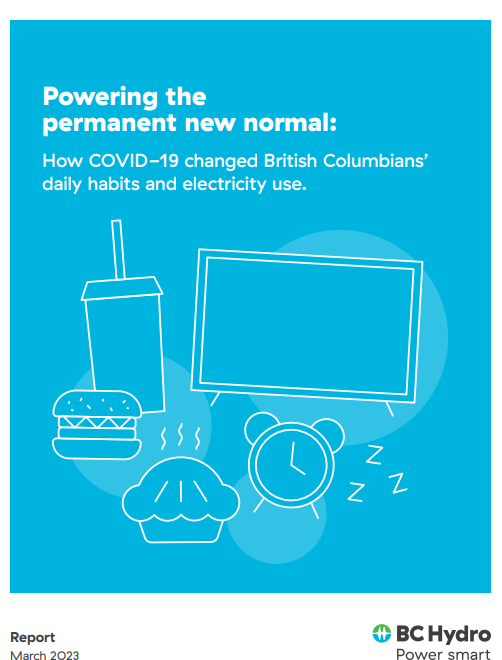A new BC Hydro report finds a change in daily routines that started at the height of the COVID-19 pandemic seems to have permanently shifted how many British Columbians use electricity at home.
The report titled “Powering the permanent new normal: How COVID-19 changed British Columbians’ daily habits and electricity use“ finds over 70 per cent of British Columbians said some aspect of their daily routine remains changed – most significantly on weekdays – three years since the COVID-19 pandemic was declared.
While overall residential electricity use is at normal levels for this time of year, BC Hydro data shows the changes to British Columbians’ daily habits has resulted in weekday electricity use peaking slightly later in the morning and earlier in the evening, much like it did in the first months of the pandemic.
This shift can be explained by some British Columbians permanently changing their daily routines because of societal changes like remote work. For example, 51 per cent said their work routine remains changed compared to pre-pandemic, and a majority of those who worked from home at least one day a week during the pandemic still do.
This might be why some are still sleeping in (26 per cent) and going to bed later (19 per cent) on weekdays. In fact, working from home and not having a commute is the main reason nearly half said they are sleeping in more on weekdays. And with less office time, some are grooming less – 15 per cent said they are showering less often in the morning and for shorter periods of time than they used to on pre-pandemic weekdays.
Being home more on weekdays has also changed the frequency and timing of cooking and chores for many British Columbians. For example, 33 per cent are still cooking dinner at home more often and earlier than pre-pandemic, and 25 per cent are still baking more as a hobby.
Working from home also means the opportunity to fit in chores during the day – 70 per cent of those who work from home said they do chores during the day on weekdays, including laundry (48 per cent) and dishes (44 per cent).
When it comes to entertainment, a reliance on streaming services is even stronger than it was in 2020 – nearly 56 per cent are watching more TV and streaming services than they were pre-pandemic compared to just 29 per cent who reported watching more in September 2020.
With many habits permanently shifted because of a life changing pandemic, BC Hydro says that British Columbians can save energy by doing the following:
- If working from home, use energy-saving features on office equipment – energy-saving modes on devices and equipment typically use around 70 per cent less energy.
- Cook with smaller appliances such as air fryers and slow cookers that use up to 75 per cent less energy than a conventional oven.
- Switch to a heat pump to heat in the winter and cool in the summer. Rebates up to $11,000 are available when switching from fossil fuels.
- Track electricity use with MyHydro to see how at-home activities impact a household’s electricity use
For more information on saving energy and rebates on heat pumps, visit bchydro.com/clean.
| COVID IMPACT | THEN (SEPT. 2020) | NOW (FEB. 2023) |
|---|---|---|
| Sleeping in on weekdays | 12% | 26% |
| Making coffee at home more | 20% | 34% |
| Making breakfast at home more | 16% | 28% |
| Showering less | 14% | 15% |
| Cooking dinner more | 26% | 33% |
| Baking more | 20% | 25% |
| Ordering takeout more | 27% | 27% |
| Watching/streaming more TV and movies | 29% | 56% |













